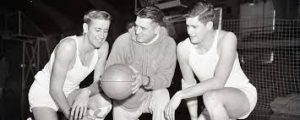As we prepare to commence the 2017 NCAA tourney we will take the next few weeks to reflect on some of the most significant anniversaries of players/coaches from tourneys past. We begin with Colorado coach Forrest “Frosty” Cox, who led the Buffaloes to the Final Four way back in 1942. He grew up in Kansas where he became an All-American for the Jayhawks under Hall of Fame coach Phog Allen before later serving as his assistant coach. He was hired as head coach at Colorado in 1936 and beat his former coach in the 1942 NCAA tourney en route to making the Final 4. After spending the final 7 years of his coaching career at Montana, he passed away in 1962. HoopsHD’s Jon Teitel got to chat with his son Frosty Cox, Jr. as well as Colorado SID Dave Plati about his conference domination and winning the 1940 NIT title.
Cox was nicknamed “Frosty” and the “Mountain Fox”: who gave him the nicknames, and how did he like them? Frosty Cox Jr.: “Frosty” was a name he got at birth so it just went with the territory. I think the “Mountain Fox” came from 1 of the local sportswriters but he always went by Frosty.
He attended college at Kansas where he was an all-conference halfback on the football team and an All-American guard on the basketball team: how did he like playing for Hall of Fame coach Phog Allen? Dave Plati: I have heard that he tried to emulate Phog’s coaching style. He was very big on fundamentals, especially on defense. People always said that he was a tiger as a coach and had no patience after the teaching period was over, but he was a father figure to everyone off the court.
In 1935 became head coach at Colorado: how did he fit into the school’s coaching legacys? DP: We had 2 legendary coaches in the 2 seasons before him: Hank Iba and Earl “Dutch” Clark.
He won the Mountain States Conference title 5 times from 1937-1942: how was he able to be so dominant for such a long period of time? DP: We were considered the top program west of the Mississippi back then. He morphed us into that and we would go play in the NIT a lot. It was really rare for a coach back then to get a lot of players from out of state but he was able to expand the recruiting horizons and look at players from outside the state.
In addition to basketball he was also a backfield coach for the football team: how did he like coaching future college football Hall of Famer/Supreme Court Justice Byron “Whizzer” White? DP: A lot of coaches back then would flip-flop as a head coach in 1 sport and an assistant coach in another sport.
In the 1st-ever NIT in 1938 he lost to Temple and NIT MVP Don Shields in the title game: where does that rank among the most devastating losses of his career? DP: I would imagine that there was some kind of vindication when they won it 2 years later so it did not sting as much. We had to travel by train back then so it was probably an adventure just getting to New York City! I have heard that the team was wiped out from all the travel.
In the 1940 NIT title game Bob Doll scored 15 PTS in a win over Duquesne: what did it mean to him to win a title? DP: I know that it was a big deal back here without any pro teams at the time. It was front page news when we won because it was pretty rare for a team from the West to head across the country and win a title. Our radio contract had not begun at that point so I wonder how long it took for the news to travel back here.
In the 1942 NCAA tourney All-American Leason McCloud scored 19 PTS in a 2-PT win over Kansas: what did it mean to him to beat his old coach or for McCloud to play his best against a team from his home state? DP: I have read that it was a big source of pride for him to beat Kansas in Kansas City. That might have been an even bigger win than the NIT title.
After leaving Colorado in 1950 and entering the cattle-raising business, he became head coach at Montana in 1955: what made him leave Boulder, and what made him get back into coaching? FCJ: He had an opportunity to go into the cattle business with my uncle in Kansas. I think he just wanted a change after 15 years, but coaching always remained in his blood. Montana had an opening so he took it.
He passed away in 1962: when people look back at his career, how do you think he should be remembered the most? DP: We inducted him into our Hall of Fame a couple of years ago and the consensus was that it was about time. When you go back and examine his numbers and accomplishments you can see that he really put our program on the map and established our 1st sense of tradition. We were not on anyone’s radar until Byron White did his thing on the football field and Frosty helped keep Colorado as a national name.




Pingback: Under the Radar Game of the Day: Furman at East Tennessee State | Hoops HD